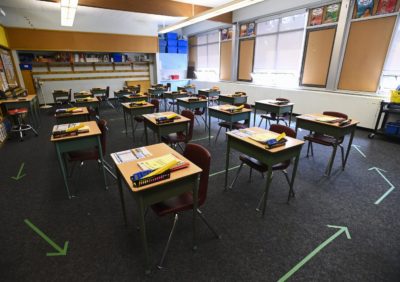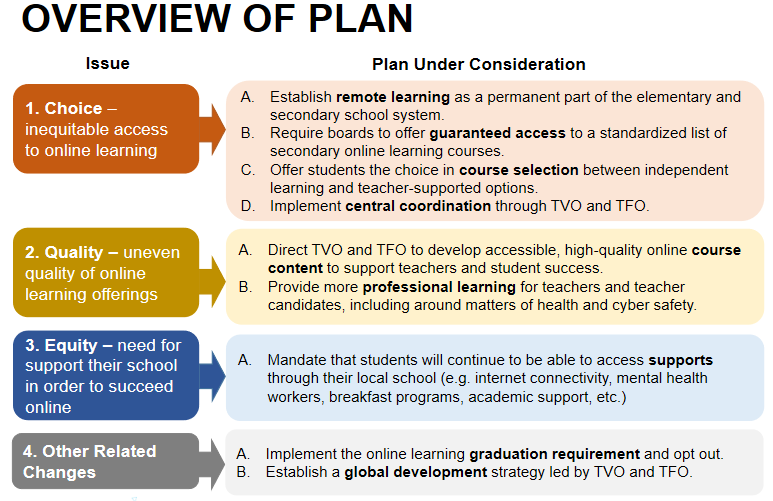 By Lana Parker
By Lana Parker
April 16, 2021
BURLINGTON, ON
Despite the lack of data documenting benefits to children, and emerging evidence of several drawbacks and harms, the Ontario government is discussing making full-time online schooling a permanent “choice” in public education.
This idea is being introduced without adequate research, and stands to become the latest measure that raises inequality and threatens the viability of education as a public good.
The Globe and Mail obtained an Ontario Ministry of Education presentation dated March 22, 2021, detailing the prospect of continued virtual learning after the COVID-19 pandemic. The province aims to partner with TVO to offer “fully independent online learning” for “Ontario and out-of-province secondary students” and also mentions continuing “synchronous remote learning” for elementary students.
The proposal coincides with apparent plans to continue to help fund Ontario education by selling curriculum abroad. In 2015, Ontario reported it had agreements with 19 international private schools that pay the province to deliver the Ontario curriculum.
Unpacking the known harms
 While the COVID-19 environment has produced unique challenges, many of the greatest difficulties for young people have been associated with the forced shift out of schools and into online learning. Online learning does not replace the complex, relationship-oriented learning and social environment in schools.
While the COVID-19 environment has produced unique challenges, many of the greatest difficulties for young people have been associated with the forced shift out of schools and into online learning. Online learning does not replace the complex, relationship-oriented learning and social environment in schools.
Fully online learning has had consequences for mental health, with increased feelings of social isolation. There have also been challenges to physical health, as youth grappled with a lack of physical activity and deteriorating eyesight. Even among older youth learners, motivation and engagement prove difficult to sustain online, with a higher potential for dropping out and worse outcomes for disadvantaged students.
Despite the negative outcomes associated with full-time online study for youth and without sufficient data to support its rationale, the Ontario government is introducing an unasked for “choice” that would set a detrimental precedent for public education.

More screen time?
Some might argue that getting students comfortable with online technologies prepares them for future study and the workforce. In my research on youth literacy and online engagement, however, I explore how student proficiency in navigating technology should not be mistaken for understanding complex information.
 My work is part of a wider body of emerging research that examines how students make sense of the online environment — and how being online affects their literacy skills, including their capacities to form critical questions and navigate misinformation and disinformation.
My work is part of a wider body of emerging research that examines how students make sense of the online environment — and how being online affects their literacy skills, including their capacities to form critical questions and navigate misinformation and disinformation.
I have also determined that literacy learning can be strengthened when students and teachers explore the emotional implications of contentious issues in a classroom community. In other words, leaving students alone in front of screens for even more of their already online-immersed day does not improve their critical thinking or engagement.
 For adolescents, learning online doesn’t replace in-person interactions with teachers, other students and community members. These interactions, far from superficial or inconsequential, are at the heart of how students learn well. In the pandemic, many teachers have voiced concerns about how an online environment hampers their ability to tailor learning and to support their students with the full range of strategies that are available in the classroom.
For adolescents, learning online doesn’t replace in-person interactions with teachers, other students and community members. These interactions, far from superficial or inconsequential, are at the heart of how students learn well. In the pandemic, many teachers have voiced concerns about how an online environment hampers their ability to tailor learning and to support their students with the full range of strategies that are available in the classroom.
Yet another worrying aspect is the risk to student privacy. There is ongoing concern about how tech companies may be gaining unprecedented insight into children’s lives and how data may be used.
There are also issues of tech monopolies that muddy the line between public education and private enterprise.
Generating revenue
Students have opportunities to engage with online learning in Ontario’s current framework. There is no need to introduce compulsory online courses or the option of full-time online learning.
With all the issues implied by full-time online learning, why would Ontario consider making this a permanent feature of public education? Before the pandemic, in February 2020, the government .
In a confidential Ontario government document written sometime between March and August 2019 and obtained by the Toronto Star, the current Ford government detailed a plan to dovetail cuts to school board funding with the opportunity to “to develop (a) business model to make available and market Ontario’s online learning system to out-of-province and international students.” It is telling that the document did not foreground the benefits of full-time online learning for students.
The reasons for this shift can be attributed to the ongoing drive to privatize public education through the twin aims of reducing costs and generating new revenue. The 2019 document also mentioned examining “feasible options for selling licensing rights to courses/content to other jurisdictions.”
Curriculum sales
The current discussions should be seen in the context of Ontario’s drive to create revenue streams through international student tuition and sales of curriculum to international schools.
Ontario’s March 22 proposal for online schooling describes a plan to develop curriculum and offer an education with little teacher support.
This “business plan” follows Minister of Education Stephen Lecce announcing the appointment of a former CFL commisioner to the role of TVO’s CEO. TVO’s website has been recently retooled to include an emphasis on “digital learning.”
Potential future harms
For children, fully online learning creates the conditions for further educational inequality. It is a particular risk for children with special education needs.
It can also produce unintended consequences: a recent study based in Ecuador showed female students working online were more likely to spend time doing housework than their male counterparts. It is not unimaginable that some families could select online schooling for their children so they could help with household work, care for family members and potentially supplement family income by entering the labour market earlier. The move also risks limiting opportunities for extra-curricular socialization and learning, including experiences with the arts and sports.
Once poorly researched educational policy comes into practice, it is difficult to undo irrespective of data that details its harms. Such has been the case with the introduction of standardized testing in Ontario, which marginalizes newcomers and students with exceptionalities, and encourages a narrow curriculum.
Over time, a policy of “choice” for full-time online schooling weakens public education by diluting in-person opportunities for students and eroding funding. An impoverished public system drives families into private schools, which further erodes the public good. Defunding and marketization will leave public education in a race to the bottom.
Background links:
Expanding student access to on line and remote learning – the provincial government agenda
Toronto reveals secret provincial government report about on-line learning –
Laura Parker is an Assistant Professor, Faculty of Education, University of Windsor



















It is obvious that this Ford government is more interested in limiting education than promoting it. Just look at the person who is the Minister of Education. The guy is wholly unsuited to the post.
Good point. The Minister has apparently never held an actual job other than being a political acolyte and operative. What could go wrong?
Well with all due respect Perry neither Conservatives nor Liberals have been able to “progressively” reform the education system. Both have pandered to a special interest constituent, the teachers and their unions, that have become far too powerful, entrenched and entitled. If the current system effectively prepared students for their future lives and careers then I might feel differently. But here, as in so many other areas such as healthcare and the justice systems, we have “progressively” lost our way. The students are held hostage by both sides – politicians and educators – and seem to be the last consideration of both, despite high sounding rhetoric and empty promises. I will put my full support behind any Party that has the courage and integrity to advocate for a single, secular-based school system.
Of course to “Progressive” Conservatives, permanent virtual education sounds like the Promised Land, the final battle in the war to defeat the evil teachers unions. Millions and Billions saved and a whole generation of pliant young voters who lack any critical thinking skills or civic responsibility. Orwell would turn in his grave.